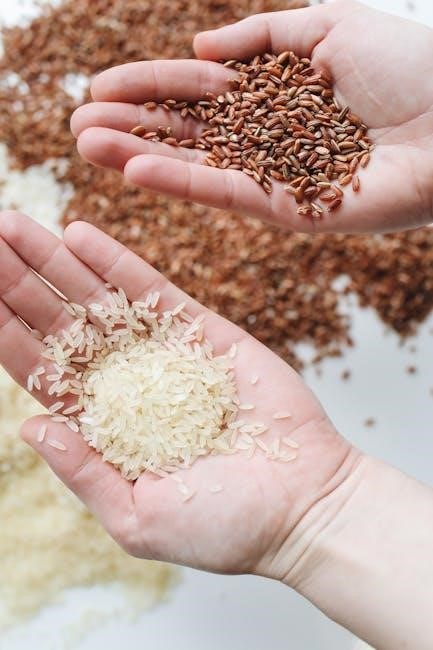PCOS Diet Plan PDF Free: A Comprehensive Guide
Are you seeking a free and comprehensive PCOS diet plan PDF? This guide offers insights into managing Polycystic Ovary Syndrome through tailored dietary adjustments. Discover expert advice for hormone balance.
Understanding PCOS and the Importance of Diet
Polycystic Ovary Syndrome (PCOS) affects 1 in 10 women, creating hormonal imbalances and various health issues. These can encompass diabetes, cardiovascular problems, and mood swings. Diet plays a pivotal role in managing PCOS symptoms.
A poor diet exacerbates insulin resistance, impacting hormone balance. Insulin, essential for breaking down sugars, becomes less effective, leading to elevated blood sugar levels. The body compensates by producing more insulin, triggering the ovaries to produce excess androgens like testosterone.
This hormonal imbalance disrupts periods, causes acne, and promotes weight gain. Therefore, a diet that reduces insulin resistance is crucial. A well-structured PCOS diet plan helps stabilize blood sugar, manage weight, and alleviate PCOS symptoms. Embracing healthy eating habits is a significant step.
Learn about the best and worst foods for PCOS.
The Role of Insulin Resistance in PCOS
Insulin resistance is a key factor in Polycystic Ovary Syndrome (PCOS). It occurs when the body’s cells don’t respond effectively to insulin, a hormone that regulates blood sugar. This resistance forces the pancreas to produce more insulin to maintain normal glucose levels.
Elevated insulin levels, or hyperinsulinemia, trigger the ovaries to produce excess androgens, such as testosterone. These androgens contribute to many PCOS symptoms, including irregular periods, acne, and excessive hair growth. The excess insulin also promotes weight gain, particularly around the abdomen, making weight management difficult for women with PCOS.
Addressing insulin resistance through diet and lifestyle changes is crucial for managing PCOS. A diet low in refined carbs and high in fiber helps stabilize blood sugar levels, reducing the demand for insulin. Exercise also enhances insulin sensitivity, improving the body’s response to insulin.
Consider the impact of insulin resistance for effective PCOS management.
Foods to Include in a PCOS Diet
A PCOS-friendly diet should prioritize whole, unprocessed foods that help regulate blood sugar levels and reduce insulin resistance. Focus on nutrient-dense options that provide sustained energy and support hormonal balance. Incorporating a variety of these foods can improve overall health and manage PCOS symptoms effectively.
Non-starchy vegetables like leafy greens, broccoli, and cauliflower are rich in fiber and nutrients, promoting satiety and stable blood sugar. Fruits with lower glycemic indexes, such as berries, apples, and pears, offer essential vitamins and antioxidants without causing rapid glucose spikes.
Healthy fats from sources like avocados, nuts, seeds, and olive oil can improve insulin sensitivity and reduce inflammation. These fats also support hormone production and overall well-being.
By focusing on these food groups, you can create a balanced and nourishing diet that supports PCOS management. Remember, consistency and mindful eating are key to achieving long-term health benefits.
High Fiber Foods
High-fiber foods are crucial for managing PCOS due to their ability to slow down digestion and stabilize blood sugar levels. Fiber helps prevent rapid glucose spikes, reducing insulin resistance and supporting weight management. Incorporating fiber-rich foods into your diet can significantly improve PCOS symptoms.
Excellent sources of fiber include whole grains like oats, quinoa, and brown rice. These provide sustained energy and help regulate bowel movements. Legumes such as lentils, chickpeas, and black beans are also packed with fiber and protein, making them a filling and nutritious addition to meals.
Fruits and vegetables are naturally high in fiber, especially when eaten with their skins. Berries, apples, pears, broccoli, and spinach are great choices. Adding these foods to your diet not only increases fiber intake but also provides essential vitamins and minerals.
Aim for at least 25-35 grams of fiber per day to reap the full benefits. Gradually increase your fiber intake to avoid digestive discomfort. High-fiber foods are a cornerstone of a PCOS-friendly diet.
Lean Proteins
Lean proteins are essential for women with PCOS. They help stabilize blood sugar levels, promote satiety, and support muscle mass. Incorporating adequate protein into your diet is crucial for managing PCOS symptoms and supporting overall health.
Excellent sources of lean protein include poultry like chicken and turkey, especially when skinless. These options are low in fat and high in protein, making them ideal for weight management.
Fish, particularly fatty fish such as salmon, tuna, and sardines, provides both protein and omega-3 fatty acids. Omega-3s are beneficial for reducing inflammation and improving insulin sensitivity. Plant-based options like tofu, tempeh, and lentils are also great sources of lean protein.
Eggs are another versatile and affordable source of protein. They can be incorporated into various meals and snacks. Greek yogurt is also a good option, providing protein and probiotics for gut health.
Aim to include a source of lean protein in every meal to help regulate blood sugar and keep you feeling full. This supports weight loss and overall metabolic function.
Foods to Avoid in a PCOS Diet
Managing PCOS through diet involves not only what you should eat, but also what you need to avoid. Certain foods can exacerbate insulin resistance, inflammation, and hormonal imbalances, making PCOS symptoms worse.
Limiting or eliminating these foods can significantly improve your overall health and well-being.
Refined carbohydrates, such as white bread, pastries, and sugary cereals, are quickly broken down into glucose, leading to rapid spikes in blood sugar and insulin levels. These spikes can worsen insulin resistance, a common issue in women with PCOS.
Dairy products may increase testosterone levels due to the presence of Insulin Growth Factor 1 (IGF-1), which can disrupt hormonal balance. Trans fats, often found in fried and processed foods, contribute to inflammation and can increase the risk of heart disease.
Sugary drinks like sodas and fruit juices cause rapid blood sugar spikes and provide little nutritional value. Avoiding these foods is crucial for managing PCOS effectively.
Refined Carbs
Refined carbohydrates are a significant concern for women managing PCOS due to their rapid impact on blood sugar levels. These carbs, found in processed foods like white bread, pastries, and sugary cereals, are quickly broken down into glucose.
This rapid breakdown leads to a spike in blood sugar and a corresponding surge in insulin, exacerbating insulin resistance, a common issue in PCOS.
Consuming refined carbs can trigger a vicious cycle, where elevated insulin levels promote the production of androgens, further disrupting hormonal balance.
Moreover, refined carbohydrates often lack essential nutrients and fiber, contributing to empty calories and increased inflammation.
Avoiding or significantly reducing refined carbs is crucial for stabilizing blood sugar, improving insulin sensitivity, and managing PCOS symptoms effectively.
Opting for whole grains, fruits, and vegetables provides a more sustained energy release and essential nutrients without the detrimental effects of refined carbohydrates.
Dairy Products

Dairy consumption and its impact on PCOS is a debated topic. For some women with PCOS, dairy products may exacerbate symptoms due to their potential to increase inflammation and androgen levels.
Cow’s milk contains Insulin-like Growth Factor 1 (IGF-1), which can mimic insulin in the body. In women with PCOS and existing insulin resistance, this can trigger androgen production, leading to hormonal imbalances.
However, not all individuals with PCOS react negatively to dairy.
Some studies suggest that low-dairy diets can improve insulin sensitivity and reduce testosterone levels, indicating a potential benefit for certain individuals.
If you suspect dairy is contributing to your PCOS symptoms, consider alternatives like almond, soy, or coconut milk.
Eliminating dairy temporarily and monitoring your body’s response can help determine whether it is a trigger for you.
Consulting a registered dietitian is beneficial for personalized dietary recommendations.
Bad Fats

Navigating the world of fats is crucial for managing PCOS. Not all fats are created equal; some can exacerbate inflammation and insulin resistance, common concerns for women with PCOS.
Trans fats, often found in processed foods, fried items, and certain baked goods, are particularly detrimental. They are known to increase the risk of heart problems and type 2 diabetes, both of which are linked to PCOS.
Hydrogenated and semi-hydrogenated oils, frequently used to extend shelf life, also fall into the category of “bad fats.”
Limit your intake of refined and vegetable oils, as they can contribute to inflammation.
Instead, opt for healthier alternatives like coconut oil, which may help reduce insulin resistance and boost metabolism.
Healthy fats, such as those found in avocados, nuts, seeds, and olive oil, should be prioritized in your PCOS diet.
Reading food labels carefully and choosing whole, unprocessed foods can help you minimize your consumption of harmful fats.
Sugary Drinks
Sugary drinks pose a significant challenge for women managing PCOS. These beverages often lead to rapid spikes in blood sugar levels, exacerbating insulin resistance, a common characteristic of PCOS.
Avoid sodas, bottled fruit juices, and sweetened smoothies, as they are typically loaded with added sugars.
These sugary concoctions can contribute to weight gain and inflammation, further disrupting hormonal balance.
Instead of relying on sugary drinks for hydration, opt for water, unsweetened tea, or infused water with fruits or herbs.
If you crave something sweet, choose whole fruits over fruit juices.
Fruits contain fiber, which helps slow down the absorption of sugar, preventing drastic blood sugar fluctuations.
Be mindful of the sugar content in seemingly healthy beverages like sports drinks and flavored waters.
Reading labels carefully is essential to identify hidden sugars and make informed choices.
By eliminating sugary drinks from your diet, you can support better blood sugar control, reduce inflammation, and promote overall well-being while managing PCOS.
Sample PCOS Diet Plan for Weight Loss
Losing weight with PCOS requires a strategic approach that combines a balanced diet with regular physical activity. A sample PCOS diet plan should prioritize whole, unprocessed foods that help regulate blood sugar levels and reduce insulin resistance.
Start your day with a breakfast rich in protein and fiber, such as eggs with spinach and avocado, or a smoothie made with berries, protein powder, and almond milk.
For lunch, opt for a salad with grilled chicken or fish, or a lentil soup with whole-grain bread.
Dinner should include lean protein, such as baked salmon or turkey breast, paired with non-starchy vegetables like broccoli or asparagus.
Snacks can include a handful of nuts, Greek yogurt, or a small piece of fruit.
This sample plan focuses on reducing refined carbs and increasing the intake of protein, fiber, and healthy fats.
Remember to drink plenty of water throughout the day and adjust portion sizes to meet your individual calorie needs.
The Importance of Calorie Deficit for Weight Loss
Achieving a calorie deficit is crucial for weight loss, especially for women with PCOS. A calorie deficit simply means consuming fewer calories than your body burns daily. This forces your body to tap into its fat reserves for energy, leading to weight reduction.
For women with PCOS, a calorie deficit helps to combat insulin resistance and hormonal imbalances that often contribute to weight gain. By reducing your overall calorie intake, you can improve insulin sensitivity and stabilize blood sugar levels.
To create a calorie deficit, start by tracking your current calorie intake and then gradually reduce it by 250-500 calories per day. Focus on nutrient-dense foods like lean proteins, non-starchy vegetables, and whole grains to feel full and satisfied while consuming fewer calories.
Regular exercise can also contribute to a calorie deficit by increasing your daily calorie expenditure. Combining a calorie deficit with a healthy diet and exercise is the most effective way to lose weight and manage PCOS symptoms.
Exercise Recommendations for Women with PCOS
Regular exercise is vital for women with PCOS, helping to manage weight, improve insulin sensitivity, and balance hormones. A combination of cardio and strength training is often recommended for optimal results.
Cardio exercises, such as brisk walking, jogging, swimming, or cycling, help burn calories and improve cardiovascular health. Aim for at least 150 minutes of moderate-intensity cardio per week or 75 minutes of vigorous-intensity cardio.
Strength training exercises, such as lifting weights or using resistance bands, help build muscle mass, which can improve insulin sensitivity and boost metabolism. Aim for at least two strength training sessions per week, targeting all major muscle groups.
High-intensity interval training (HIIT) can also be beneficial for women with PCOS, as it involves short bursts of intense exercise followed by periods of rest. HIIT can improve insulin sensitivity and promote weight loss.
Choose exercises that you enjoy and can stick to long-term. It is important to listen to your body and adjust your exercise routine as needed.
Popular PCOS Diet Plans
Several diet plans have gained popularity for managing PCOS symptoms, each with unique approaches to address insulin resistance and hormonal imbalances. Two prominent examples are the Keto Diet and the Mediterranean Diet.
The Keto Diet focuses on drastically reducing carbohydrate intake, typically limiting it to 20-30 grams per day. The majority of calories come from fats and protein. This metabolic shift forces the body to burn fat for fuel, potentially aiding weight loss and improving insulin sensitivity.
The Mediterranean Diet emphasizes whole, unprocessed foods, including fruits, vegetables, whole grains, lean proteins, and healthy fats like olive oil. It also restricts saturated fats, processed meats, and refined sugars.
Both diets can be effective for managing PCOS, but it is essential to consider individual needs and preferences. Consulting a registered dietitian can help determine the most suitable diet plan.
Ultimately, the best diet plan is one that is sustainable and aligns with long-term health goals.
Keto Diet
The Keto Diet is a popular choice for managing PCOS due to its focus on drastically reducing carbohydrate intake. This reduction forces the body to enter a state of ketosis, where it burns fat for energy instead of glucose.
For women with PCOS, the Keto Diet can potentially improve insulin sensitivity, reduce androgen levels, and promote weight loss. By limiting carbs to around 20-30 grams per day, the diet aims to stabilize blood sugar levels and reduce insulin resistance, a common issue in PCOS.

However, the Keto Diet requires careful planning to ensure adequate nutrient intake. It’s essential to focus on healthy fats, moderate protein, and non-starchy vegetables.
Possible side effects include the “keto flu,” characterized by fatigue and headaches. Consulting with a healthcare professional or registered dietitian is crucial before starting the Keto Diet, especially for individuals with pre-existing health conditions.
Long-term sustainability can be a challenge.
Mediterranean Diet
The Mediterranean Diet offers a balanced and sustainable approach to managing PCOS, emphasizing whole foods and healthy fats. This diet is rich in fruits, vegetables, whole grains, legumes, nuts, and olive oil, promoting overall well-being and hormonal balance.
For women with PCOS, the Mediterranean Diet can help reduce inflammation, improve insulin sensitivity, and support weight management. It encourages the consumption of lean proteins like fish and poultry while limiting red meat and processed foods.
By focusing on whole, unprocessed foods, the Mediterranean Diet provides essential nutrients and fiber, aiding in blood sugar control and satiety. The diet’s emphasis on healthy fats, particularly from olive oil and nuts, can also contribute to improved cholesterol levels and heart health.
The Mediterranean Diet is relatively easy to follow and adapt to individual preferences. It allows for a variety of delicious and satisfying meals, making it a sustainable long-term dietary choice.
Its anti-inflammatory properties can also help alleviate PCOS symptoms.
Free PCOS Diet Plan PDF Resources
Seeking a free PCOS diet plan PDF? Numerous online resources offer downloadable guides tailored for women managing Polycystic Ovary Syndrome. These PDFs often include meal plans, recipes, and food lists designed to support hormonal balance and weight management.
Websites dedicated to women’s health, nutrition, and PCOS often provide these resources as a way to empower individuals to take control of their health. Registered dietitians and nutritionists may also offer free PCOS diet plan PDFs on their websites or blogs.
When searching for a free PCOS diet plan PDF, ensure the source is credible and the information is evidence-based. Look for plans that emphasize whole, unprocessed foods, lean proteins, healthy fats, and fiber.
Some PDFs may also include tips for managing insulin resistance, reducing inflammation, and improving fertility. Remember to consult with a healthcare professional or registered dietitian before making significant changes to your diet, especially if you have underlying health conditions.

Utilize these free resources to kickstart your journey towards better health and well-being with PCOS.